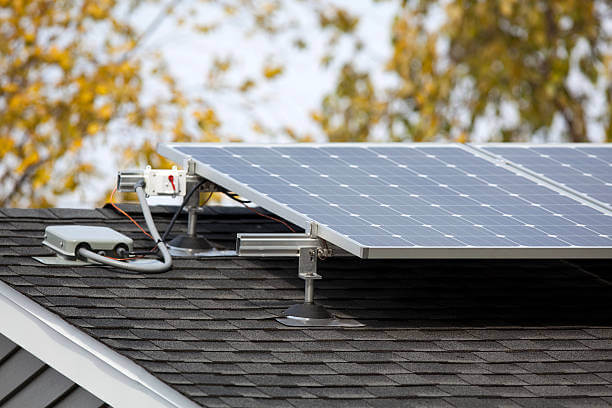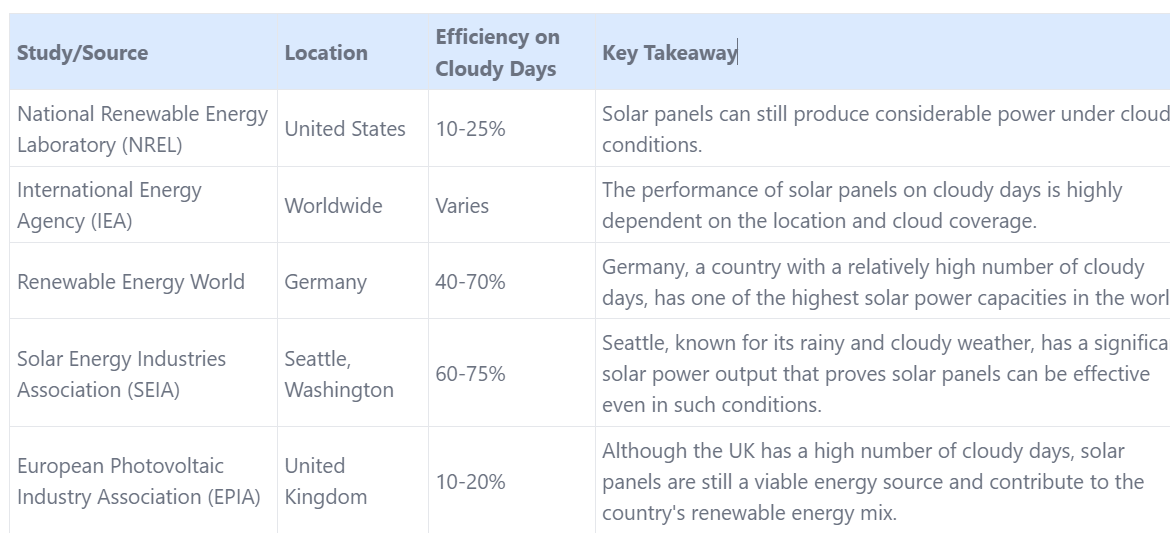- Home
- How to Use Solar Energy At Home
- How Well Do Solar Panels Work on Cloudy Days
how well do solar panels work on cloudy days-The Truth About Their Performance on Cloudy Days
Solar energy provides a sustainable and renewable power source that has become increasingly popular in recent years. But what happens when the sun isn't shining? Many people wonder: how well do solar panels work on cloudy days? This might be one of your concerns, especially if you live in a region with frequent cloud cover or overcast weather.
Rest assured, while it's true that solar panels thrive under direct sunlight, they are still capable of functioning and generating electricity on those gloomy days.
Understanding Solar Panels: How They Work And Respond To Cloudy Weather
Solar panels work by using photovoltaic cells to convert sunlight into electricity, but cloudy weather affects their efficiency as the level of cloud coverage reduces the amount of direct and indirect sunlight that reaches the panels.
Explanation Of Photovoltaic Cells And Energy Conversion
Solar panels, also known as photovoltaic (PV) panels, consist of numerous individual photovoltaic cells made from silicon. These PV cells are the essential components responsible for converting sunlight into electricity—an extraordinary process that relies on the properties of semiconducting material within each cell.
In simple terms, when photons from sunlight hit a solar panel's surface and enter one of its photovoltaic cells, they cause electrons within the cell to loosen and move around freely.
To better grasp this energy conversion process at work in PV cells, let's consider an everyday example: powering an electric fan using a solar panel. As sunlight hits the panel's surface, it causes electrons to begin moving through a circuit connected between the fan and solar panel.
Despite common misconceptions that suggest otherwise, direct sunlight is not necessary for PV cells to function effectively—though it certainly helps improve their efficiency levels! Surprisingly enough, even during overcast conditions where clouds seem impenetrable by sunrays or when hues reflected off surrounding environments appear dimmed down significantly due to low light intensity levels in certain geographical areas; these resilient devices can still churn out impressive amounts of power—between 10% and 25% compared with what they would produce in full-blown sunshine.
The Impact Of Cloud Cover On Solar Panel Efficiency
Cloud cover can have a significant impact on solar panel efficiency, as the amount of sunlight that reaches the panels is reduced. When clouds block direct sunlight, the energy output of solar panels decreases.
The extent to which cloud cover impacts solar panel performance depends on several factors, including the thickness and type of clouds present, time of day, and season. However, even with lower light levels and partially blocked sunlight due to clouds or haze, modern photovoltaic cells are still able to produce electricity efficiently.
Factors That Affect Solar Panel Performance On Cloudy Days

Cloud cover is one of the main factors that affect solar panel performance on cloudy days. Other factors that can impact their efficiency include:
1. Thickness of cloud cover: This affects the intensity of sunlight reaching the panels. Thicker cloud covers will have lower intensities, reducing power generation.
2. Time of day: Solar panels generate the most energy during peak sunlight hours. Cloudy weather shortens this period, affecting overall energy production.
3. Panel orientation and location: The positioning of solar panels also impacts their efficiency on cloudy days. South-facing panels may perform better than west-facing ones because they get more direct sunlight.
4. Type and quality of solar panels: High-quality, monocrystalline solar panels generally perform better in low light conditions than other types.
5. Efficiency of inverters: Inverters convert DC power from solar panels into AC power which is usable for appliances. Poorly designed or inefficient inverters can reduce overall output.
6. Importance of ambient light: Ambient light levels also play a role in determining how well the panels perform on cloudy days.
By understanding these factors, you can optimize your solar panel setup to ensure maximum power generation even during cloudy weather conditions.
Measuring Solar Panel Efficiency On Cloudy Days: Factors To Consider
Factors that affect the efficiency of solar panels on cloudy days include the type and quality of solar panels, panel orientation and location, inverter efficiency, and the impact of ambient light.
The Type And Quality Of Solar Panels
The type and quality of solar panels are crucial in determining their performance on cloudy days. It's important to consider the materials and technology used in creating solar panels when searching for a solution that can withstand low-light conditions.
High-quality panels typically include those made from durable materials like polycrystalline or monocrystalline silicon, while thin-film solar cells may be less expensive but have lower efficiency rates.
Furthermore, bifacial modules stand out as an option worth considering because they generate energy from both sides of the panel, allowing them to collect ambient light reflected off clouds and surroundings rather than just direct sunlight.
Panel Orientation And Location
The orientation and location of solar panels play a crucial role in their efficiency on cloudy days. Ideally, solar panels should be installed facing south to ensure maximum exposure to direct sunlight throughout the day.
However, this may not always be possible due to factors such as shading from nearby buildings or trees. In such cases, it is essential to place the panels at an angle that allows them to receive adequate ambient light.
Additionally, regular cleaning of the panels is necessary since buildup of dust and debris can significantly reduce their efficiency.
The Efficiency Of Inverters

Inverters play a crucial role in the efficiency of solar panels on cloudy days. In simple terms, inverters are responsible for converting direct current (DC) generated by solar panels into alternating current (AC), which can be used to power homes and businesses.
During low light conditions, such as cloudy days when solar panel output is reduced, high-quality inverters can boost power generation and ensure that energy is efficiently transferred to the electrical grid.
Choosing an efficient inverter that matches the specifications of your solar system can improve its performance significantly, especially during suboptimal weather conditions.
The Importance Of Ambient Light
Ambient light refers to the general level of lighting in an area. It is worth noting that solar panels are not solely reliant on direct sunlight to produce electricity. Instead, they can function on diffuse or scattered light known as ambient light.
While it may be true that cloudy days reduce the energy output of solar panels due to less direct sunlight being absorbed, there are still ample amounts of ambient light available for them to work efficiently.
In fact, some studies suggest that while panel efficiency reduces with cloud cover, anything more than 20% can significantly increase their power production during high ambient light situations.
Real-life Examples And Data Analysis: Solar Panel Performance On Cloudy Days
Discover the fascinating research findings and in-depth data analysis on how solar panels actually perform on cloudy days, including specific examples of their efficiency in different geographical regions.

This data analysis demonstrates that solar panels can still generate significant power on cloudy days, with the efficiency depending on factors such as geographical location and cloud coverage. Nevertheless, the effectiveness of solar panels in diverse climates highlights their potential as an essential component of our sustainable energy future.
Comparison Of Solar Panel Performance In Different Geographical Regions
Solar panel performance can vary depending on the geographical region. Areas with high cloud coverage and low sunlight intensity, such as Seattle or London, may experience reduced power output from their solar panels compared to those located in sunny regions like Arizona or California.
However, this does not mean that solar panels are not a viable option for these areas. In fact, some cloudy regions still have enough ambient light to generate electricity from renewable sources.
Research shows that even in countries like Germany, which experiences long periods of overcast weather, solar energy still accounts for a significant portion of the country's total energy production. Factors such as proper installation and maintenance can also improve the performance of solar panels in any location.
Overall, while direct sunlight is ideal for optimal solar panel efficiency, it is important to note that photovoltaic cells can still generate electricity under various weather conditions and across different geographical regions.
Improving Solar Panel Performance On Cloudy Days: Tips And Solutions
Regular maintenance and cleaning, appropriate panel placement and installation, incorporation of energy storage systems and hybrid solar solutions, use of solar trackers, and advancements in solar panel technology are all ways to improve the performance of solar panels on cloudy days.
Regular Maintenance And Cleaning
To ensure that your solar panels still produce energy efficiently on cloudy days, regular maintenance and cleaning are essential. Here are some tips to keep your solar panel systems running smoothly:
- Inspect your solar panels regularly for damage, debris buildup, or shading from nearby trees or buildings. Remove any debris such as leaves, dust, or bird droppings using a soft brush or damp cloth.
- Keep an eye on the wiring connections to ensure they are not loose or damaged. Damaged wires can reduce the efficiency of the system.
- Check the inverter frequently to make sure it's working correctly. Clean it with a soft brush and keep it free from accumulated dust.
- After heavy rainfalls, check your panel's basement for water intrusion.
- In snowy climates clear snow off of your panels so they can continue to collect power even when it is cloudy.
Regular cleaning and maintenance can help extend the life of your solar panels and keep them working at their maximum efficiency. Remember: Proper care is key!
Appropriate Panel Placement And Installation
The placement and installation of solar panels on a property can significantly impact their performance on cloudy days. It is important to place them in an area that receives the most amount of sunlight throughout the day, such as a south-facing roof or open field.
Proper installation is also crucial for ensuring adequate airflow between the panel and roof to prevent overheating, which can reduce overall efficiency. Additionally, it's important to regularly clean debris and dust from the panels' surfaces as this can block sunlight absorption.
Incorporation Of Energy Storage Systems And Hybrid Solar Solutions
One way to improve solar panel performance on cloudy days is by incorporating energy storage systems and hybrid solar solutions. These solutions allow for the collection and storage of excess energy generated during sunny hours, which can be used later to power homes or businesses when solar panels aren't producing as much energy. Here are some options:
1. Battery Storage Systems: These systems use batteries to store electricity produced by solar panels during the day when their output is highest. This stored energy can then be used at night or during times when the panels aren't generating enough power.
2. Hybrid Solar Systems: These systems combine traditional electricity sources with solar energy to provide a reliable source of power even on cloudy days. The solar panels provide additional power when available, reducing reliance on grid electricity.
3. Smart Grid Technology: This technology allows for more efficient use of renewable energy sources like solar power through monitoring and management of electrical supply and demand.
4. Micro-Inverters: These inverters allow each individual panel to operate independently, optimizing efficiency under varying sunlight conditions.
By incorporating these solutions into existing solar panel setups, households and businesses can rely less on traditional power sources and further reduce their carbon footprint while enjoying consistent access to electricity.
Use Of Solar Trackers
Solar trackers are devices that help improve solar panel efficiency by following the sun's path and adjusting panel orientation accordingly. By doing so, they can increase the amount of direct sunlight captured by up to 25%, which means more energy produced.
Although there is an added cost for installing solar trackers, their effectiveness in boosting power production has made them increasingly popular. In fact, data shows that solar panels with trackers can produce up to 45% more energy compared to fixed-tilt systems under certain weather conditions.
Advancements In Solar Panel Technology
One of the most exciting aspects of solar power is that technology continues to advance and improve. Researchers are constantly developing new ways to make solar panels more efficient and cost-effective, which means that even on cloudy days, we can still rely on this source of renewable energy.
For example, researchers at MIT have developed a super-thin solar cell that is just 1/50th the thickness of a human hair. These ultra-thin cells are not only more lightweight and easy to transport, but they also have the potential to be used in a wider range of applications than traditional bulky panels.
Additionally, some companies are exploring new materials for solar cells, such as perovskite crystals or organic polymers, which could drastically reduce costs while maintaining high levels of efficiency.
The Potential Of Solar Energy On Cloudy Days And Its Role In Our Sustainable Future
In conclusion, the efficiency of solar panels on cloudy days is often underestimated. While direct sunlight is preferred, solar panels still have the potential to generate electricity even without it.
The level of cloud coverage and other factors can affect their performance, but regular maintenance and appropriate installation can improve their efficiency. As we look for sustainable energy sources, solar energy continues to play a vital role in our future.
Key Takeaways
- Solar panels can still generate electricity efficiently on cloudy days, although their output will be lower than in direct sunlight.
- Factors affecting solar panel efficiency on cloudy days include cloud cover thickness, time of day, panel orientation and location, type and quality of solar panels, efficiency of inverters, and ambient light levels.
- Regular maintenance such as cleaning and appropriate installation can significantly improve the performance of solar panels on cloudy days. Advanced solutions such as energy storage systems and hybrid solar solutions are also available to optimize their generation potential.
- How to use solar energy at home
- Can solar panels be installed on a metal roof